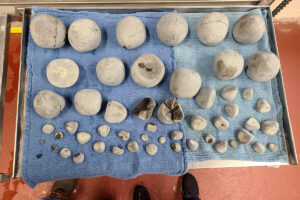Unraveling the Link Between Glucose and Insulin in Sick Horses

By Jill Griffiths, Dr. Allison Stewart, and Dr. François-Rene Bertin
Very ill horses—those with severe colic, for example—often have very high blood glucose levels and very low insulin levels. Researchers know that, in such situations, death is a common result. What they’re still trying to figure out is the cause and effect of this complex interaction.
Researchers from The University of Queensland, in Australia, and Auburn University, in Alabama, recently took a closer look at the links between insulin and glucose in acutely ill horses.
They studied 58 horses aged 5 and older admitted to Auburn’s J.T. Vaughan Large Animal Teaching Hospital as emergency cases and diagnosed with systemic inflammatory response syndrome (SIRS). A SIRS diagnosis required horses to have two or more of the following: high heart or respiratory rates, high or low body temperature, or abnormal white blood cell counts. The team evaluated horses’ hormone and glucose concentrations
Create a free account with TheHorse.com to view this content.
TheHorse.com is home to thousands of free articles about horse health care. In order to access some of our exclusive free content, you must be signed into TheHorse.com.
Start your free account today!
Already have an account?
and continue reading.
Related Articles
Stay on top of the most recent Horse Health news with

















